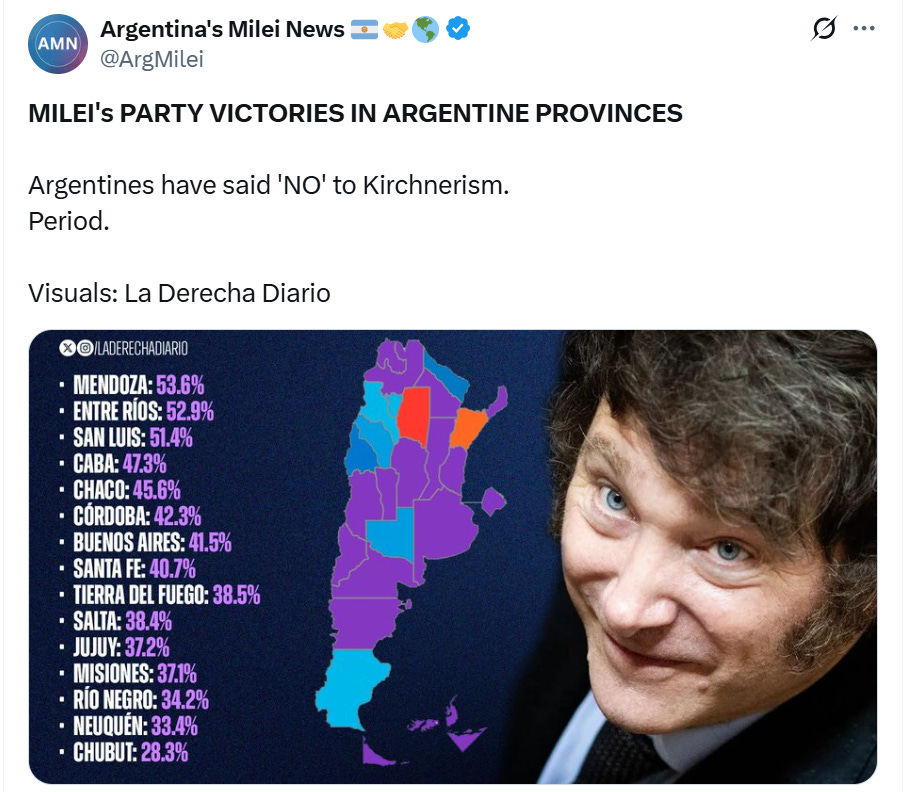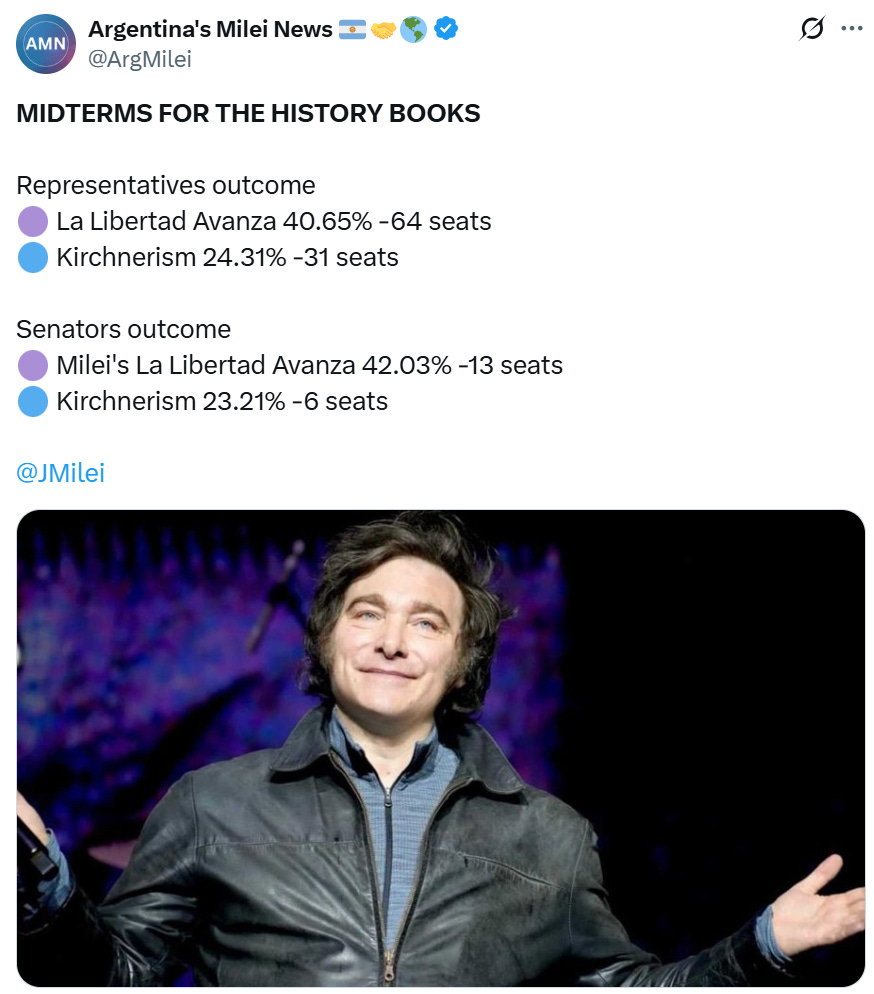Argentina's midterms: A referendum on freedom and a resounding victory
On Sunday, the world's only libertarian president secured a resounding victory in what was dubbed a "referendum on freedom". This should give hope to all of us who are fighting for a free future.
We are pleased to introduce our new series: What is happening in Argentina! Each month, Fighting for a Free Future Associate, Luke Lucas, will report for Voices for a Free Future on what has been happening under the world’s only libertarian presidency.

The background
Argentina has long struggled from Peronism, a form of corporate totalitarianism that has strangled the economy. To understand the impact Peronism has had on Argentina, we must first glance over the history, starting from Spanish Independence.
Argentina was a long-forgotten part of the Spanish empire with no natural minerals to plunder. Following independence, Argentina swung between civil wars and dictatorships before finally finding prosperity in the mid-19th century when it adopted an almost verbatim copy of the US Constitution. It was a shining example of liberal free-market thinking, demonstrating the ideas of Hayek, Mises and Adam Smith. Argentina thrived through entrepreneurship and industrialisation, growing from a forgotten and ravaged part of the world to the 8th largest country in the world by GDP. However, this would all be dismantled by a military coup in 1930 by General Uriburu.
In 1943, following yet another military coup, Juan Perón rose to prominence. The eponym Peronism follows redistribution of wealth to buy friends and votes, populism, heavy regulation and a corporatist balance of the country’s interest groups with an interventionist state. Debt-spending was financed by printing money, leading to hyperinflation, which was tamed in the 1990s by Menem, who adopted more market-oriented policies, but hyperinflation returned and by 2023 had reached almost 300 per cent. In retrospect, the economic damage of Peronism has been obvious, but despite this, the decade before Milei’s election, the Peronists doubled downed on their policies, more intervention, more regulation, more redistribution, more inflation and more poverty.
The election
The National Congress of Argentina is bicameral, and prior to the election, La Libertad Avanza (LLA – Milei’s party) had 37 out of 257 seats in the Chamber of Deputies (lower branch) and 6/72 in the Senate (upper branch). Because Milei lacked a congressional majority, he had to impose reforms by emergency decree, which, under the Argentinian constitution, must be backed by one branch of the house. In fact, in his first year, Milei amended almost 100 laws by decree. These ranged from the budget to public debt and the pension system.
Despite this, since taking office in 2023, Milei has curbed inflation from almost 300% to 30% currently, and the economy has even begun growing with a 0.3% increase in August.
His efforts brought immediate success for Argentina, by cutting the number of central government ministries from 18 to 8, abolishing mandatory payments to unions from employee’s pay cheques, abolishing state funding to news media as well as other actions, Argentina saw monthly inflation fall to under 5%, reached a primary surplus of $2.4 billion and a fiscal surplus of $620 million. Creating the first time in 123 years that Argentina did not have a budget deficit.
But Milei has not just focused on macroeconomics: he has removed regulations that suffocated the economy. Using the emergency decrees, Milei has removed rent controls, price controls and import controls. The former led to rents falling in some cities, and listings increased after deregulation, according to local market reports.
In the wake of this, Milei has painted his midterm elections as a referendum on freedom: a demonstration that his policies represent progress rather than extremism – that they are sound and effective, not just a free-market experiment.
For this election, half of the lower chamber and one-third of the senate were up for re-election, 127 and 24 seats respectively. Half of the lower house seats were elected in 2019 when LLA did not exist, translating to: any seats obtained in this election would be pure gain.
The government predicted they would gain about 30-35% of the seats, allowing them to have enough members in Congress to block the Peronists and wider opposition trying to override vetoes and more broadly defend their agenda. In 2025, the opposition has overturned several of Milei’s presidential vetoes. Most notably, the budget increases for public universities, children’s hospitals and disability assistance.
Against all predictions, Milei and his party secured a resounding victory; they gained 64 seats in the lower chamber and 13 seats in the senate, totalling 101 and 21 seats respectively. This is just short of the 129 needed to push legislation through the lower house, but with smart political alliances such as with the Republican Proposal party, Milei has a big enough majority to block vetoes and push through his libertarian agenda.

The future
The future looks bright for Argentina, but is not clear-cut. The LLA is almost the biggest bloc in the Chamber of Deputies, which will alleviate some legislative gridlock. This also strengthens Milei’s position as being the largest party by vote share in the election, showing public approval of the libertarian message.
The political outcomes allow for Milei to accelerate his economic policies such as deregulation, privatisation and fiscal reforms. The markets have reacted positively to the election, the peso has strengthened, and stock indices jumped. This stabilises the Peso, eases inflation expectations and decreases risk premium. International economic actors will therefore increase support, believing that Milei’s policies will have the tenure to reap the benefits and reduce the likelihood of Peso runs. This is echoed by Trump promising a $20 billion aid package that has the potential to double prior to the election. Milei will have a short-term fiscal breathing room from a renewed wave of optimism that his austerity and deregulation plan will succeed.
Already in Western media, you are seeing a narrative shift, no longer is Milei radical but reformist, and his policies are necessary modernisations instead of ideological extremism. Overnight, the Overton window has shifted towards classical liberalism, bringing free-market ideas to the mainstream. But this is not a modernisation, for Argentina has already proven to flourish under a libertarian regime. Milei is simply restoring Argentina to its former glory as an economic powerhouse using tried and tested policy and economic soundness.
But this has not been without criticism. In the lead up to the election, opponents called the election “a referendum on a libertarian anarcho-capitalist experiment that was causing brutal economic and social suffering with its severe austerity measures and had decided to delegate economic management to officials from another country”1.
Although, as stated, this is not clear-cut or guaranteed. Milei will have to form fragile alliances to get the majority in the houses needed to push through his reforms and policies. This election was also a low turnout, and Milei secured just shy of 41 per cent of the votes compared to the Fuerza Patria’s almost 32 per cent. Milei is not a politician, he is leading based on ideology, not populism. This decisive political style could lead to a fracture from within.
However, it is not doom and gloom; this is a historical weakening of Peronism. This will reshape provincial politics and governors. Local parties will start to see LLA as a pragmatic and reasonable rather than an idealistic and radical choice. Argentina will shift to market-oriented politics and away from populist consensus.
Where does Argentina go from here?
As children, we are taught by our parents that we cannot buy sweets with money that we do not have, we cannot go beyond our monetary means. Yet somewhere along the way, this gets lost. Governments across the world have adopted a spend first, tax later approach; they spend outside of their resources and look for the money later. Taxation is a gluttony of governments to solve populist problems that leads to population flight, and eventually you run out of people to tax to fund policies you can’t afford.
It’s not enough to have a good economic plan; the public must believe the austerity is worth it long term, and the midterm results show that the public believes in Milei’s vision. We must not forget Argentina's free market past - libertarian values have saved Argentina before, and they will do so once again, for this is not some radical new economic theory; Milei is simply reintroducing a form of economics that has been proven to work, not just for Argentina, but for the whole world.
As Cicero once said, historia migistra vitae: history the teacher of life. The international community will be eagerly watching to witness Milei’s libertarian policies nurture the Argentinian economy and prove that small state governance is the right way to allow modern economies to succeed.



This result is simply fabulous news. You can count on the fingers of one finger the number of Libertarians in power. Argentina needs him as do those of us who believe in sound money, small government and balanced budgets. Afuera!